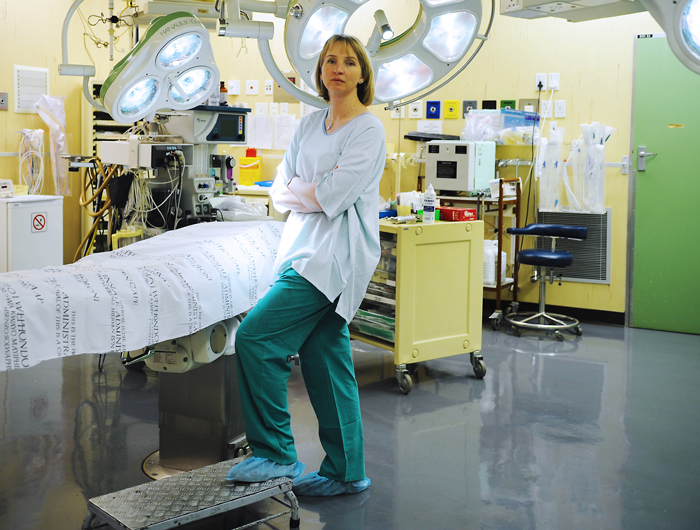Kidney transplants a viable option for some HIV-positive patients
27 February 2015 | Story by Newsroom
The survival rates of HIV-positive patients who have received kidney transplants from HIV-positive donors are showing significant success, according to a recently published paper by UCT academics.
A paper published in the New England Journal of Medicine (12 February 2015) shows that kidney transplants from HIV-positive deceased donors is a viable additional treatment option for selected HIV-infected patients (on antiretroviral treatment) who need renal replacement therapy.
Between September 2008 and February 2014, 27 HIV-positive patients underwent kidney transplants at Groote Schuur Hospital. The survival rates of patients were 84% at one and three years and 74% at five years. The corresponding graft survival rates were 93%, 84% and 84%.
The outcome of kidney transplantation in HIV-positive patients is reported to be similar to the outcome in high-risk patients without HIV infection, says lead author, Professor Elmi Muller.
Muller is based at UCT's Department of Surgery and at Groote Schuur Hospital. In October 2008 she became the first surgeon in the world to transplant a kidney from an HIV-positive donor to an HIV-positive recipient. (In 2011 Muller scooped the health caregivers category of the Shoprite Checkers Women of the Year Awards.)
Muller's co-authors are Professors Marc Mendelson of the Division of Infectious Diseases and Del Kahn of the Department of Surgery, and Dr Zunaid Barday of the Division of Nephrology.
Their findings are significant as South Africa has one of the highest incidences of HIV infection in Africa. The rollout of antiretrovirals has been very successful in extending the lives of those with HIV.
Groote Schuur Hospital has an active kidney transplant programme; each year 50 to 70 kidneys are transplanted, 30% of these from living donors.
South Africa has many HIV-positive patients with end-stage renal failure. With the biggest HIV population in the world, there are an increasing number of HIV-positive deceased donors, says Muller.
A major concern about these transplants is the risk of transmission of a new and possibly resistant strain of HIV from donor to recipient. This is when a strain or subtype of HIV triggers a more rapid progression of HIV in the transplant recipient.
The patients in this study did not show any clinical evidence of this happening, however. Viral loads remained undetectable in all patients.
Rejections rates among HIV-positive recipients were reported to be approximately three times as high as those among HIV-negative recipients.
"These results correspond with rejection rates found in the large NIH study that was done in the USA using HIV-negative kidneys into HIV-positive recipients," said Muller.
The reason for this is still unknown, she adds, but offers two hypotheses: immune dysregulation and the challenge of managing the drug interactions between the antiretroviral agents and the immunosuppressants used to lower the body's ability to reject the transplanted organ.
The proposal to perform transplantations from an HIV-positive donor to an HIV-positive recipient also raised several ethical issues, the paper reports, the first being the validity of the informed consent.
"When the study started, HIV-positive patients were not able to access dialysis or receive a HIV-negative kidney transplant, leaving them with no other option than a HIV-positive kidney transplant," Muller added. "This situation changed in 2010 when dialysis and general transplantation became available to HIV-positive patients."
And although HIV-positive patients became eligible for dialysis after the first year of the study, this is still a very limited resource and many patients with stage-5 chronic kidney disease, regardless of HIV status, do not qualify for dialysis.
"The programme has now received NIH funding to do viral sequencing on both donors and recipients, and the study has also expanded to look at some of the immunological reasons why these patients have such high rejection rates," said Muller.
"We are hoping to enrol more recipients into the study as well as to increase the number of brain-dead donor referrals form HIV-positive patients."
(The research is funded by Sanofi South Africa and the Roche Organ Transplantation Research Foundation.)
Story by staff reporter. Photo by Katherine Traut.
 This work is licensed under a Creative Commons Attribution-NoDerivatives 4.0 International License.
This work is licensed under a Creative Commons Attribution-NoDerivatives 4.0 International License.
Please view the republishing articles page for more information.










